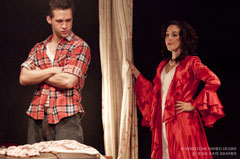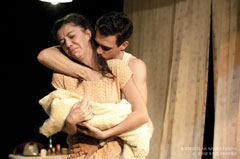
Top stories






More news
















Under the inspired and caring direction of Luke Ellenbogen, Williams' tragic comedy bursts to life with such energy, verve and vivacity that it's hard to believe that you are actually watching a production in Cape Town with third- and fourth-year students of UCT's drama production raising the bar for the excellence of theatre and vibrant new talent. These are the actors of tomorrow and, judging by the passionate performances by the ensemble of energetic performers, there is something to look forward to in the near future.
It's encouraging and inspirational to find UCT presenting a play of this magnitude, truly putting the actors through a blender that delivers a potent energy drink consisting of emotional and physical lustre.
Widely considered a landmark play, A Streetcar Named Desire deals with a culture clash between two characters: Blanche DuBois, a relic of the Old South; and Stanley Kowalski, a rising member of the industrial, urban working class.
The play presents Blanche DuBois, a fading-but-still-attractive Southern belle whose pretensions to virtue and culture only thinly mask alcoholism and delusions of grandeur. Her poise is an illusion that she presents to shield others (but most of all, herself) from her reality, and an attempt to make herself still attractive to new male suitors. Blanche arrives at the apartment of her sister Stella Kowalski in the French Quarter of New Orleans, on Elysian Fields Avenue; the local transportation she takes to arrive there includes a streetcar route named "Desire". The steamy, urban ambiance is a shock to Blanche's nerves. Blanche is welcomed with some trepidation by Stella, who fears the reaction of her husband Stanley, an American immigrant.
The play deals with the conflict between two ways of life: the old civilisation vested in Blanche is demonstrably decadent; in sexual terms the old world is associated with febrile femininity and the new world with a charismatic, but brutal, masculinity.

A delicate flower, a porcelain doll wrapped in barbed wire, Ella Gabriel delivers a feisty and fragile tragic heroine who falls from grace, a woman who seeks refuge from unhappiness in the pursuit of pleasure, however destructive to herself and others. Blanche belongs to the crumbling grandeur of the Southern plantations whose aspirations and idealistic delusions turn enchantment into a nightmarish house of horrors. Gabriel brilliantly allows the childlike naiveté of her character to battle the inner demons that haunt her and uses a sensitive aggression to mask her fears. Gabriel gracefully portrays the tragic flaw of her character that undermines her heroic and admirable qualities; Gabriel's alluring performance captures the isolation that her character has to deal with as well as her refusal to accept her sexuality, which she denigrates as "brutal desire", thinking of it as a "rattle trap" streetcar that bangs through the Quarter. Blanche harbours dreams of a happy-ever-after ending of her story, in which she as "a woman of intelligence and breeding" can enrich a man's life.
Roelof Storm will break your heart as Stanley Kowalski. During the final moments of the play, the command Storm has in allowing his character to be as cold as stone and not be affected by the tragedy and chaos that surrounds him is astounding. Storm's adds a youthful aloofness to his Stanley, a man of the city who asserts his maleness and lack of refinement and, where he cannot dominate sexually, he uses brutal force.
In the play Stanley is described as a 20th-century Pan-Dionysus, a modern embodiment of the ancient spirits of anarchic sexuality and the pursuits of pleasure, capable of impulsive cruelty to those who will censor or confine them. Storm encapsulates this perfectly and is truly mesmerising during his silent intonations, where he is rendered helpless and defenceless. Storm equally manages to destroy the likeability of his character with raw aggression that raises hell and fear. His ignorant and insensitive Stanley destroys Blanche's composure to make her recognise that she is the same as he, a sexual animal epitomising the struggle between effeminate culture and masculine libido.
Imke du Toit's brittle-and-bruised Stella Kowalski is heartbreaking; Du Toit perfectly balances her determination to hold on to Stanley, with Blanche's antagonistic invasion. Blanche desperately tries to undermine Stella's belief in the worth and rightness of her marriage to Stanley, she challenges her sister to define the nature and value of her relationship with Stanley and attempts to dismiss Stella's "brutal desire", which will drag Stella back with the animals in a primitive life without beauty. Du Toit successfully manages to balance her loyalty to husband and her sister; she is the crucial battleground over which Blanche and Stanley fight.
Oliver Booth impresses as Mitch and delivers a touching performance that is emotionally sensitive and demure, like a volcano ready to explode; he represents the possibility of Blanche's future happiness, the prince on a white horse who can possibly provide security and plant a hope in Blanche that ultimately underscores her catastrophe. Booth serves his character well and poignantly captures his tortured humanity, emphasising the strengths and vividness of both Stanley and Blanche by offering the contrast of his own weaknesses and insipidity.
In an age in which we are bombarded with conversational drama that spills over from sitcom and dilutes the true nature and impact of "real" drama, it is refreshing to sit through a play that is longer than 60 minutes and reminds us of what prodigious writing is all about. Tennessee Williams describes his writing as "lyric", offering a musical quality that is the expression of his person and reveals his feelings and thought.
The language of the play is shaped by character identification and thematic development. Williams' potent themes are dealt with head on in this production. The nature and effects of human sexuality offer some hard core and effective moments that are shocking and provocative; its voracious energy cleverly disguises the attempts made to control or domesticate it by self-consciously civilised sections of society. The explosive conflicts, raw relationship between love and hate, between emotional and physical needs fuel the drama.

There's also the recurring theme of death; a sense of the inexorable decay of beauty accentuated by the brutality of much of modern urban life linked to the fear of personal disintegration with nostalgia for a past we can never escape.
Truth and reality is subjective in A Streetcar Named Desire and the audience can magically bond with Williams' personal vision, which is skilfully and reverently interpreted by Ellenbogen, who illuminates his direction with an equally striking lighting design and music (implemented by Kiroshan Naidoo and Sizwe Mnisi, respectively).
Blanche's melodramatic state of mind is expressed visually in a poetic and theatrical way; her horrid reflections are vividly brought to life as flashbacks during the course of the play, turning it into a play within a play that offers a further dimension to the complex nature of Williams' creation. When she hears the music in her mind, Blanche drinks to escape it and the sense of disaster closing in on her; the music is also heard by the audience. Stanley is associated with the powerful noise of a locomotive and rambling streetcar; modern brutality representing impressive machine-muscle.
It is an effective theatrical device to draw the audience into Blanche's nightmare; she and they share the same experience so that the audience is persuaded to believe the truth of Williams' intention. It shows how powerful poetry can be in theatre and equally showcases skilful showmanship.
A Streetcar Named Desire is as relevant today as when it was enjoyed 855 performances ago in New York in 1947, described by the New York Post as "a squalid, tumultuous, painful, steadily arresting and oddly touching study of feminine decay ... "
Its contemporary resonance is particularly striking in the South African context: the play deals with the conflicts between traditional values, an old-world graciousness and beauty versus the thrusting, rough-edged physically aggressive materialism of a new world.
Rating 5/5
Book your seats at www.webtickets.co.za
Read more about A Streetcar Named Desire at www.writingstudio.co.za/page1746.html
